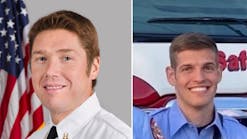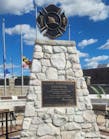Recent news coverage of minors acting in an adult capacity in rescue organizations has brought to light another entirely teen-operated public response agency in Littleton, Colorado.
Arapahoe Rescue Patrol, Inc. serves as the official search and rescue organization for Arapahoe County, Colorado. They report to the county sheriff but operate independently as a private, non-profit organization.
Like Darien EMS in Connecticut, previously profiled on Firehouse.com, the organization has adult supervisors but positions high school students to fill the ranks, command operations and drive the emergency vehicles.
Also like Darien EMS, Arapahoe Rescue Patrol is well established and has an excellent relationship with their professional colleagues.
County Sheriff Grayson Robinson has been associated with the group for 33 years of their nearly 50 years in service.
"They are exceptional, there's no question," the sheriff said. "They are well trained, motivated, and they serve our community with pride and distinction."
Robinson said he feels so strongly about the organization that he works to obtain grants for them, contributes used emergency vehicles to them, and includes them in his organizational chart. "They've earned that," he said.
Program graduate Jarret Winkelman said the patrol was organized to utilize teens because they were such an untapped resource.
"The reason the patrol was founded, was in 1957 they were looking for a second [search and rescue] team in the state, and they couldn't find enough adults that were interested," Winkelman said. "They found the teens that were interested, and it just worked out."
Winkelman said the patrol responds to about 140 calls per year. He said they do sometimes experience high call volume, such as during a blizzard in 2003 that brought 41 calls in 50 hours.
The members are typically between 14 and 18 years old, and get their drivers licenses at 16. All members go through a defensive driving course for use in their personal vehicles, to make it safer for teens to respond for duty with other teens, Winkelman said.
A select few of the teens -- currently about three of the organization's 45 members -- also drive the patrol's vehicles, which include a rescue truck, a 15-passenger van which was reduced to an 11-passenger van, and a command post.
The drivers receive training specific to each vehicle and have the authority to drive with lights and sirens under emergency conditions, although they have chosen not to do so with the 15-passenger van out of safety concerns.
The group does not drive ambulances or do any patient transport, but they do provide emergency medical care. All members learn CPR and some become First Responders. Winkelman said Colorado does not allow EMT certification for those under age 18, so the organization has a special, internal program called Advanced First Responder, which teaches the same curriculum.
Like the Darien, Connecticut teen ambulance drivers, these responders see a lot at a young age. "We see things that some people don't see ever," Winkelman said. "You grow up quickly."
Winkelman said that despite their youth, the teens are able to work professionally alongside adult public safety organizations.
"We tell members when they come in, that every other team in the state has adults. So when we go out for mutual aid calls, we have to make ourselves five times as good as all of them to be viewed as equals," he said. "If we make one little mistake, even if it's the same mistake as another team that has adults on it, the other teams will look at us and say, 'They made the mistake because they're teenagers.'"
Winkelman said the group selects its members carefully to protect their reputation, but added that there are many teens capable and willing to do the work.
"The youth is an excellent resource to use, especially in the emergency services," he said. "It keeps them doing something focused, something focused toward the community, and most of them have several thousand community service hours."
He said it also helps the teens avoid peer pressures because they are on call 24 hours a day, and want to be ready for the next call.
"If you find the right people they can be an excellent resource," he said.
The sheriff agreed, and said he doesn't consider the teen rescue patrol to have any limitations compared to a traditional patrol group. He said some communities would require the members to have law enforcement authority, which this group does not, but he believes it is unnecessary to place a highly paid officer or sheriff's deputy in a role that the teens are able to fulfill. "In reality it's an efficiency," he said.
He added that their youth, which some might consider a limitation, he considers an asset because of their energy and enthusiasm. "With one phone call I typically get 45 members," he said, "and they're deployed very quickly."
Like supporters of Darien EMS, the sheriff also prides the organization for recruiting people into the world of public safety, so they can later serve other professional and volunteer agencies.
He said the issue of 16 and 17-year-olds driving rescue vehicles under emergency conditions does not concern him because they are so carefully selected and trained.
Winkelman reported that after almost 50 years in service, running an average of 140 calls per year, the teen-operated rescue patrol has had just two accidents, neither of which resulted in any injuries.
"That's a pretty remarkable record," the sheriff said. "I wish my deputies were able to brag with that record."
Related:





